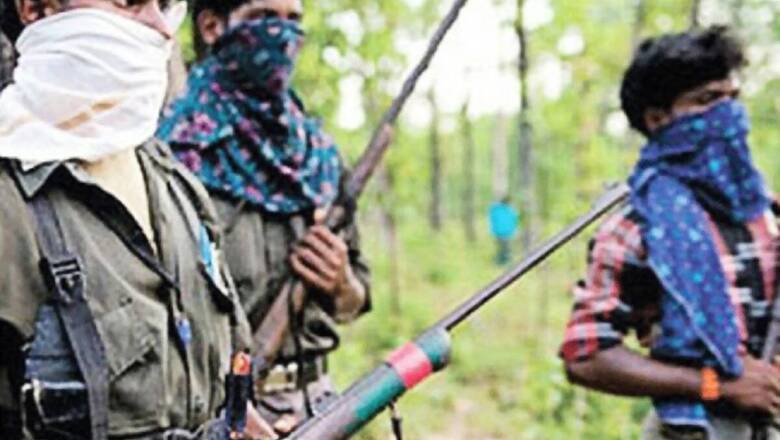
views
Chhattisgarh’s Maoist-affected Bastar region has seen several Adivasi-led movements over the past 20 years since its birth on issues of ‘Jal, Jangal, Jameen’. Caught in the crossfire between armed guerrillas and state forces, local Adivasis have often come out to fight for their survival. Though as the violence itself abated the frequency of these movements seemed to have slowed down.
However, over the past few months, this jungle region has seen three major protest movements against security forces, in one of which 21-gram panchayat officials resigned from their posts to show their anger against the administration’s apathy. To be precise the anger is against the rising number of new camps being set up by the security forces as they push the cornered red extremists deeper into the jungles.
According to data obtained by News18, 7 new camps were opened by various paramilitary forces in 2018, 10 new camps were opened in 2019 and 16 new camps were opened last year. Thousands of Adivasis, who have sat on hunger strikes and blocked state highways against the rising network of security forces’ camps in December 2020 alone, say they have a number of unaddressed complaints against the forces.
Also read: ‘BJP-RSS Doesn’t Want Adivasis, Dalits Educated’: Rahul Gandhi After Govt Ends SC Scholarship Scheme
Leaders of the Congress, the ruling party, feel that the Adivasis are “misinformed”, police officers suspect Maoists to be behind these protests and civil society leaders feel the ever-growing presence of police and paramilitary to be behind the unease among locals. In this ground report, News18 tries to find the reasons why Adivasis are upset with the state forces.
Kanker
At least 21 public representatives from 103-gram panchayats have resigned within the last one month to protest the construction of two BSF camps in Koyalibeda area of Kanker district. The reason for the anger is that the local Adivasis consider the land on which the camp came up in November last year to belong to their deity Bhurkal Bidda, to pray to which people from 37 nearby villages assemble once every year.
For several days and nights in December, Adivasis from these villages sat on a hunger strike for five days against the newly set up camp.
Pilu Usendi, a local who has also participated in these protests, said that the anger is not against the camps per se, but about the place which the security forces chose to set up their camp. “In the name of setting up the camp, the administration has hurt our religious sentiments by choosing to build it in the same place where we and generations before us have prayed to our deity. The entire place has been desecrated. Trees have been cut down indiscriminately. And all this happened without any consultation with us,” Usendi said.
Locals have given a month’s notice to the government to vacate the land after which they plan to protest on an even larger scale. Kanker’s district collector Chandan Kumar told News18 that the administration is looking into the grievances of the locals and ascertaining the reasons behind mass gram panchayat-level resignations.
Narayanpur
Since December 3 last year, Adivasis have been protesting against an iron ore mining project and a security camp that has come up near it. For nearly 10 days, 4,000 Adivasis blocked the Narayanpur-Orchha highway, bringing all traffic in the region to a standstill.
The villagers have alleged that the project was announced without consulting the locals. The protest intensified after police made a few arrests. The protesters now want the mining project scrapped, the security camp to go, and those arrested to be released.
Bijapur
Hundreds of protesters clashed with the police on December 23 last year during their agitation against a new police camp in the area. One jawan was reported hurt and 16 locals were arrested. According to media reports, nearly 5,000 Adivasis had undertaken the protest. They submitted a charter of 15 demands to the local administrative official, asking for an Anganwadi centre, scrapping of mining in the area along with the police camp, taking efforts to revive Indravati river, and setting up school and health facilities on priority.
A local, Ayatu Tati, who was part of the protests, said, “We had undertaken a peaceful protest against the Bailadila mining project. Our protest against the NMDC’s mining project is not new. The entire water supply of the area has been contaminated. It has turned red. So, we were naturally apprehensive of the new police camp that was being set up in the vicinity.”
Speaking to News18, Chhattisgarh’s forest and transport minister Mohammad Akbar said that the state government was working to keep local sensibilities in mind, while also trying to ensure that works of progress did not get affected.
Also read: Two Maoists Killed in Gunfight with Security Personnel in Odisha
“The government is quite clear on the fact that Vikas is quite important for the Bastar region. We have also come across reports of the 21 resignations of gram panchayat office-bearers. It seems that there has been some miscommunication from one side on these matters. But the government is working to ensure that the expectations of the public are met. If in the case of Kanker, it is found that the camp came upon a holy site, we will try to find an appropriate resolution to the matter,” the minister said.
According to inspector general (IG) of Bastar range, P Sundarraj, the 16 new base camps that have come up in the Bastar region are important to secure the development projects that have started in the area and are also vital from the security forces’ point of view. He added that wherever these camps have been set up, Anganwadi centres, hospitals, schools will also come up in due time. The Maoists are disheartened by the work that security forces have done over the past few years and the goodwill that the forces have earned among the locals, the officer added, which is why the insurgents are now trying to prop locals to oppose the new camps.
While officials in the police and local administration say that several rounds of talks with the residents is continuing, the people want nothing short of the newly established camps being withdrawn. It appears that in the coming days these protests could fan out to other parts of the Bastar region.
Noted academic and social worker Bela Bhatia said that protests of this nature had grown over the past two years. “Increasing the number of camps is not going to help solve a problem which, at its very root, is a political problem. Bastar is an area that comes under the fifth schedule, which is governed by PESA [Provisions of the Panchayats (Extension to Scheduled Areas) Act, 1996]. It empowers gram sabhas to decide for themselves what they want. So the mandate of the local people should be taken into account,” Bhatia said.
Noted human rights worker Soni Sori said that Adivasis were apprehensive about the new camps since it was believed that they were coming up to protect new mining facilities, which is an issue that locals have been protesting against. “There is a lot of mistrust among the locals. The government will have to come here sooner or later and help win the confidence of those whose home Bastar is,” Sori said.
Read all the Latest News, Breaking News and Coronavirus News here




















Comments
0 comment